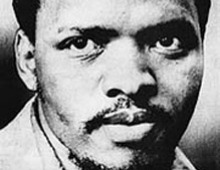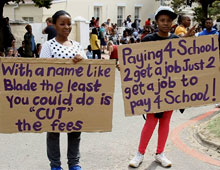[intro]Our campuses are undoubtedly the greatest site of current struggle. But last month, two speakers came together at the Durban University of Technology (DUT) to speak about the legacy of Steve Biko. Wits student activist, Simamkele Dlakavu and Black Consciousness Movement (BCM) stalwart Dr Nchaupe Aubrey Mokoape presented papers that looked at the continuing role of the BCM 39 years after the brutal murder of Biko at the hands of the apartheid security police.[/intro]
It was somewhat fitting that the talk was organised by DUT and Umtapo. The former, a university where violent clashes between police and students in recent weeks has seen the institution close its doors, and the latter, a non-profit development organisation which aims to educate, train and mobilise.
Simamkele Dlakavu gave the first presentation, titled ‘Feminism, Fallism, Socialism: The Role of Black Consciousness in the struggle for a free Azania’. It was engaging, embracing and offered a no-nonsense, critique of post-Apartheid rule under our current government.
She criticised the concept of the ‘rainbow nation’ while speaking to the realities of land dispossession, poverty, the disempowering public education system, rampant unemployment, and unequal wealth distributions. “94’ changed fokol,” she said, echoing the sentiment of the fallist movement that has emerged over the past year.
Dlakavu stressed the need to read BC literature alongside writings by Black Feminists within the struggle for true emancipation and empowerment. Her presence was significant, as she was one of the four women who bravely staged the silent #RememberKhwezi protest at the August 2016 Independent Electoral Commission Press Briefing.
“We need to take all forms of oppression seriously…How do we reimagine a protest culture and a protest space where all forms of oppression matter?” she said.
Steve Biko’s emancipation and the project of liberation
Aubrey Mokoape, contemporary and close friend of Steve Biko, gave his presentation titled, ‘Black Consciousness in Perspective: Then & Now’. He provided a first-hand account of the formative ideas which went on to constitute the philosophy of Black Consciousness, as well as the social contexts which shaped its philosophy.
His presentation provided an emotionally gut-wrenching account of one of South Africa’s most tragic eras. Most importantly, he examined why the project of complete emancipation – of mind, land, and resources – which was central to the BCM, is largely unfinished.
He voiced concern that the work of the BCM was a project completely derailed, without any currency for the here and now and central to his argument was what he viewed as the ‘unbroken trajectory of colonialism and capitalism’. Mokoape said that what we are currently witnessing is just one of the consequences of the maldistribution of income and the ownership of resources concentrated in the hands of the minority.
Whilst this is a factual reality, we must also take account of the gross maladministration of State Owned Enterprises [eg. SAA, ESKOM, PRASA], the distorted ordering of national budgetary priorities, the privileged enrichment of a select politically connected elite and the growing militarisation of the security forces.
They buried only his body, not his ideas
An Orwellian option appears to be the preferred path to the ultimate destruction of a free and open society these days. Back then the enemy was at least more readily recognisable, dressed up in khaki camouflage uniforms driving army personnel carriers. Now, the racial classification of being ‘Black’ may be all the camouflage necessary for the enemy to dwell amongst us undetected.
As quirky or idiosyncratic as all of this may appear, there is a degree of complicity of the present South African government in snuffing out the great light of full emancipation which the life and work of Steve Biko represented.
The seminar reflected that much remains unresolved and there was absolutely no doubt that the life and legacy of Steve Biko still offers South Africa one of the best intellectual, philosophical and pragmatic frameworks within which to reconstruct a just and equitable society. Strangely, it genuinely felt as if the humble and gentle, yet deeply incisive figure of Steve Biko was present in some form. But then, how could he not show up? In September 1977 they buried only the body of the man, not the man or his ideas.











เว็บสล็อตใหม่ปัจจุบัน สล็อตpgแท้ สนุกสนานกับเกมทุกแบบ ได้เลยรวมเกมสล็อตแตกง่าย
เว็บหลักเกมสล็อตPG เว็บใหญ่มาแรง pgzeed เว็บตรงไม่ผ่านเอเย่นต์ PG Slot สมัครฟรี ฝากถอนออโต้
เว็บตรง 100% สล็อต ฝากถอน true wallet เว็บตรง 888pg เล่นเว็บตรงไม่ผ่านเอเย่นต์
สล็อตแตกง่าย แตกบ่อย สล็อต ฝากถอน true wallet เว็บตรง 888pg ที่คุณจะได้รับเงินแบบจุใจ
CBD exceeded my expectations in every way thanks. I’ve struggled with insomnia looking for years, and after trying CBD like https://www.cornbreadhemp.com/pages/what-are-the-best-cbd-gummies-for-erectile-dysfunction pro the prime mores, I for ever trained a loaded eventide of pacific sleep. It was like a arrange had been lifted off my shoulders. The calming effects were merciful still profound, allowing me to meaning afar uncomplicatedly without sensibilities groggy the next morning. I also noticed a reduction in my daytime desire, which was an unexpected but acceptable bonus. The tactfulness was a fraction lusty, but nothing intolerable. Overall, CBD has been a game-changer in compensation my nap and angst issues, and I’m thankful to arrange discovered its benefits.
trouver un mГ©dicament en pharmacie https://kamagraenligne.shop/# pharmacie en ligne france pas cher
pharmacie en ligne france livraison internationale: kamagra 100mg prix – vente de mГ©dicament en ligne
Adventure awaits—are you ready to level up? Hawkplay
самые дешевые проститутки архангельска секс с chessie kay
секс чебоксары сале секс фистинг мужчин видео